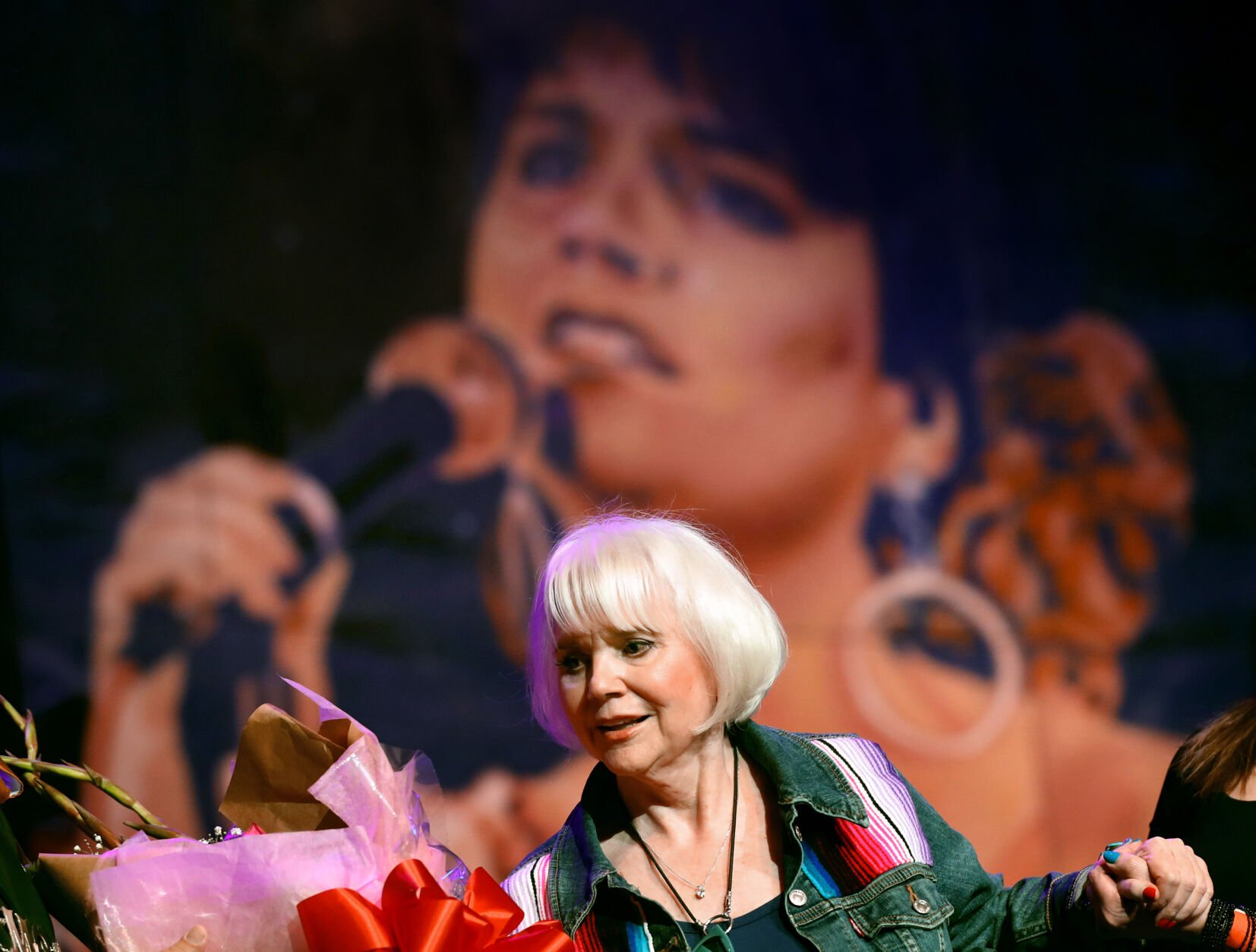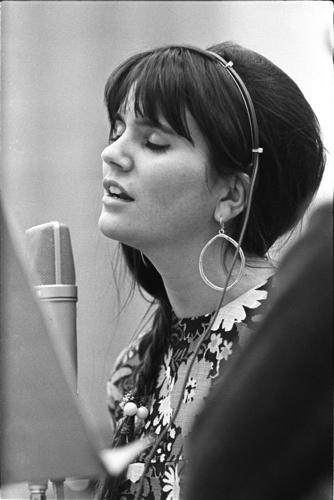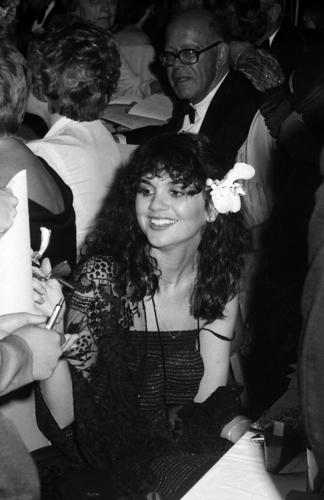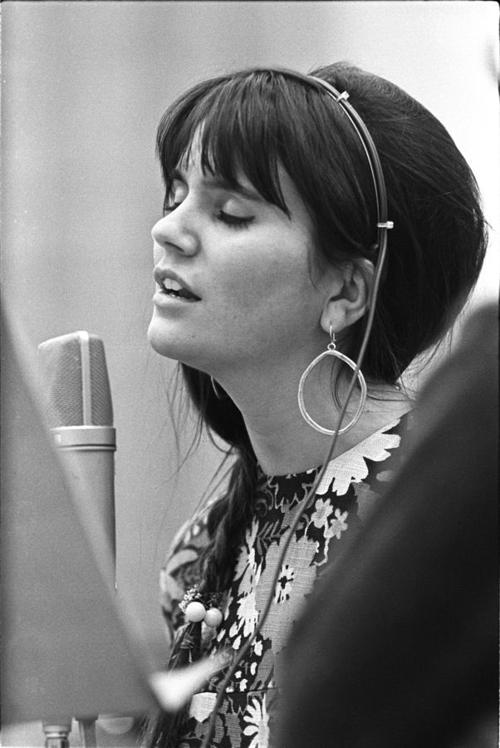Filmmakers Rob Epstein and Jeffrey Friedman dug up vintage footage of a young Linda Ronstadt for their just-released documentary “Linda Ronstadt: The Sound of My Voice.”
The clips show a vibrant and enthusiastic singer in the 1960s, decades before Parkinson’s disease silenced her voice and limited her mobility, belting out rock tunes in packed arenas and on TV.
But if you ask Ronstadt about those old clips, you will hear her cringe.
She hates them.
“I can’t bear to look at any of that,” she says. “I didn’t know what I was doing. I didn’t know how to sing. ... It took me a long time to get where I could sing well.”
The Tucson native released 24 studio albums, was nominated for 30 Grammys and took home 11, and sold more than 100 million albums in a 40-year career that transcended pop, country, folk, opera, the Great American Songbook and Mexican folk songs — but she says it took her years before she felt comfortable in her voice.
“I don’t like a lot of the stuff I recorded in the past,” said Ronstadt, 73, during a phone call from her San Francisco home last week.
“The Sound of My Voice,” which opened in theaters nationwide last Friday and opens at the Loft Cinema on Friday, Sept. 13, recounts the full breadth of Ronstadt’s career, from the time she left Tucson for Los Angeles when she was barely 18 to her fairly fast rise from small clubs to record deals and record books as the most successful female artist of her generation.
The movie opens with Ronstadt sitting among a colorful troupe of dancers and Mexican singers in a public square of Banámichi, in the Rio Sonora region of Mexico where her grandfather was born. Ronstadt made the trip last winter, a pilgrimage of sorts with extended family members and old friends, including the singer Jackson Browne.
In a voice-over while the Banámichi scene plays out, Ronstadt says, “Someone once asked me why people sing. I answered that they sing for many of the same reasons that birds sing. … They sing so the subsequent generations won’t forget what the current generations endured or dreamed or delighted in.”
And in the next breath, Ronstadt downplays her role in pop music.
“There are a lot of really good singers out in the world and a lot better singers than I am,” she says. “What I did that was different from other singers, I did a whole lot of different kinds of material. People would think that I was trying to reinvent myself, but I never invented myself to start with. I just kind of popped out into the world.”
“The Sound of My Voice” is based on Ronstadt’s 2013 book “Simple Dreams: A Musical Memoir” and focuses solely on her musical journey. We see her transformation from playing rock arenas and selling platinum pop albums to hitting heart-stopping soprano notes on Broadway in Gilbert & Sullivan’s operetta “The Pirates of Penzance.”
That, she said during last week’s phone call, was where she started to find her voice.

Linda Ronstadt signs autographs at Tucson’s Symphony Cotillion Ball in 1977.
“I sang operetta first, and that brought in my upper register a little bit more,” she said. “Then I sang standards and that brought in the whole part of my personality and my upbringing that had been denied in rock ’n’ roll. Those American standards songs are such masterpieces of songwriting craft. They allowed me to use a whole part of my voice that I wasn’t allowed to use in pop music, well in rock ’n’ roll sort of pop music. And then I sang Mexican music and that put a cherry on top. I had my complete voice. I wasn’t limited to shouting over an electric band in a stadium that wasn’t made for music.”
As of last week, Ronstadt had only seen the rough cut of the film. She said watching it was “bizarre, like watching my whole life flash before my face.”
“I got to talk with my feelings, my emotions, to tell my story and see what I felt about while I was telling it,” she said, saying the process in some ways was cathartic. “Sometimes I didn’t realize I felt this way. Sometimes it’s a shock of recognition of a feeling or emotion that you had that you didn’t realize you had.”
Photos: Tucson-native, Grammy-winner Linda Ronstadt

Linda Ronstadt arrives at Tucson International Airport on Sept. 16, 1976 for a benefit concert for the Arizona-Sonora Desert Museum.

Linda Ronstadt arrives at Tucson International Airport on Sept. 16, 1976 for a benefit concert for the Arizona-Sonora Desert Museum.

Linda Ronstadt signs autographs at Tucson's Symphony Cotillion Ball in 1977.

Linda Ronstadt at Tucson's Symphony Cotillion Ball in 1977.

Linda Ronstadt and the Stone Poneys at Minus One Coffeehouse on 6th Street Nov. 24, 1966.

Linda Ronstadt and the Stone Poneys at Minus One Coffeehouse on 6th Street Nov. 24, 1966.

Ad for a Linda Ronstadt concert at TCC in 1972.

Linda Ronstadt appearance in Tucson in September, 1976.

Linda Ronstadt concert in Tucson, February, 1975.

Linda Ronstadt in concert at the Tucson Community Center on Sept. 16, 1976. The original negatives are missing from the archives, but the photo assignment and contact sheets of all the outtakes remain.

Linda Ronstadt in concert on Feb. 9, 1975 at Tucson Community Center. Note the changed spelling on the original photo request.

Linda Ronstadt in concert at McKale Center on Nov. 2, 1980. The original negatives are missing from the archives, but the contact sheets of all the outtakes remain. Note the comment on the photo assignment.

Linda Ronstadt in concert at Tucson Community Center on Sept. 16, 1976. The original negatives are missing from the archives, but the contact sheets of all the outtakes remain.

"Heart Like a Wheel" by Linda Ronstadt, the album that started it all and went Platinum.

FILE - This Feb. 20, 1977 file photo shows singer Linda Ronstadt is flanked by Ringo Starr, left, and Paul Williams after she was named best pop singer for her "Hasten Down the Wind" at The 19th Annual Grammy Awards in Los Angeles. A documentary, “Linda Ronstadt: The Sound of My Voice,” will premiere on CNN on New Year's Day. (AP Photo)

FILE - In this 1976 file photo, California Gov. Edmund Brown Jr. and singer Linda Ronstadt stand with members of the Eagles rock group during a concert in Maryland. Brown and Ronstadt dated for several years before going their separate ways. Brown, who was re-elected to the governor's office in 2010, leaves office Jan. 7, 2019, after a record four terms in office, from 1975-1983 and again since 2011. (AP Photo/Karin Vismara, File)

FILE - This Aug. 5, 1979 file photo shows Linda Ronstadt performing during the Lowell George Tribute in Los Angeles. Now at 74, the 10-time Grammy winner and Rock and Roll Hall of Famer has been recognized as a “Legend” at the 33rd annual Hispanic Heritage Awards. (AP Photo)

Singer Linda Ronstadt performs at the Providence Civic Center in Providence, R.I., on Aug. 8, 1978. (AP Photo)

Singer Linda Ronstadt visits British rocker David Bowie backstage during his break in the Broadway play "The Elephant Man," at the Booth Theater in New York, Dec. 5, 1980. (AP Photo/Richard Drew)

Actor Kevin Kline, left, arrives at the premier of the film version of "The Pirates of Penzance" with his co-star Linda Ronstadt in New York, Feb. 18, 1983. (AP Photo/G. Paul Burnett)

Linda Ronstadt singing at Mariachi Espectacular at Tucson Community Center in on May 9, 1986.

Linda Ronstadt sings to her father, Gilbert, at the Mariachi Espectacular concert to close the Tucson International Mariachi Festival on May 9, 1986.

Linda Ronstadt at the Mariachi Espectacular concert to close the Tucson International Mariachi Festival on May 9, 1986.

Linda Ronstadt (left), Emmylou Harris and Dolly Parton (right) rehearse for the annual Country Music Association awards show at the Grand Ole Opry House in Nashville on Sunday, Oct. 13, 1986. The trio will perform during the show on Monday. (AP Photo/Dan Loftin)

Linda Ronstadt singing with her father, Gilbert, at Mariachi Espectacular on April 24, 1987 at Tucson Community Center.

Linda Ronstadt in Los Angeles on Dec. 7, 1987.

Linda Ronstadt in Los Angeles on Dec. 7, 1987.

Linda Ronstadt in Los Angeles on Dec. 7, 1987.

Linda Ronstadt with Mariachi Vargas at Centennial Hall on Feb. 11, 1988.

Linda Ronstadt with Mariachi Vargas at Centennial Hall on Feb. 11, 1988.

Linda Ronstadt, center, during an interview about a school exchange program in Arizpe, Mexico, in October, 1989.

Chuck Berry shares the stage with Linda Ronstadt during his 60th birthday celebration at the Fox Theatre in St. Louis, Mo., Oct. 17, 1986. Ronstadt is one of the guests during the concert, which was filmed for a motion picture documentary titled "Chuck Berry Hail! Hail! Rock 'n' Roll." (AP Photo/James A. Finley)

Actor Robert Wagner pictured with singer Linda Ronstadt rehearsing on the set of "Saturday Night Live," Dec. 9, 1989. (AP Photo/Timothy Clary)

Linda Ronstadt, one of the Hall of Fame's first five inductees, brought mariachi music to the masses with two popular LPs.

In the 1924 photo, Federico Ronstadt and his wife, Lupe, pose with their four sons, (from left) Bill, Edward, Gilbert and Alfred. Gilbert is Linda's father.

FILE - Singer Linda Ronstadt appears at the 26th Annual Grammy Awards in Los Angeles on Feb. 28, 1984. Now at 74, the 10-time Grammy winner and Rock and Roll Hall of Famer has been recognized as a “Legend” at the 33rd annual Hispanic Heritage Awards. (AP Photo, File)

Grammy winner Linda Ronstadt teams up with veteran arranger/conductor Nelson Riddle to perform classic ballads in Linda Ronstadt in concert with the Nelson Riddle Orchestra. Featuring songs from Ronstadt's hit LP "What's New" in 1998.

Chuy Rodriguez of Los Camperos de Nati Cano's Chuy Rodriguez sings with Linda Ronstadt during the Mariachi Conference Espectacular concert at the Tucson Arena on Friday, April 24, 2009.

Tucsonan Linda Ronstadt performs with Sam Bush at the Berger Performing Arts Center here on June 12, 2002.

Linda Ronstadt performs during the Mariachi Espectacular concert in the Tucson Arena on Friday, April 24, 2009.

This Sept. 17, 2013 photo shows American musician Linda Ronstadt poses in New York to promote the release of her memoir "Simple Dreams."


Tucson native and Rock and Roll Hall of Fame inductee Linda Ronstadt talks with Jeff Haskell during the resurrected Sunday Evening Forum at the Fox Theatre, 17 W Congress St. The Grammy award winner and pop and country music icon recently announced she has been diagnosed with Parkinson Disease. In addition to being inducted in the Hall of Fame she was also honored with the National Medal of Arts. The interview series, in which the moderator takes written questions from the audience, only recently returned in March after a 30-year hiatus. Admission was free and no reservation were accepted. The photo was taken on Sunday, October 5, 2014, in Tucson, Ariz.

President Obama shakes hands with musician Linda Ronstadt in the East Room of the White House in Washington, Monday, July 28, 2014, where he presented her with a 2013 National Medal of Arts. (AP Photo/Charles Dharapak)

Front row from left, Susan Pompeo, 2019 Kennedy Center Honorees Michael Tilson Thomas, Linda Ronstadt, Sally Field, Joan Ganz Cooney, Lloyd Morrisett and Kennedy Center President Deborah F. Rutter, back row from left, Secretary of State Mike Pompeo, 2019 Kennedy Center Honorees Philip Bailey, Verdine White, Ralph Johnson, characters from "Sesame Street," Abby Cadabby, Big Bird, and Elmo, Kennedy Center Chairman David M. Rubenstein, Ricky Kirshner and Glenn Weiss pose for a group photo following the Kennedy Center Honors State Department Dinner at the State Department on Saturday, Dec. 7, 2019, in Washington. (AP Photo/Kevin Wolf)

Maria Muldaur, left, and Linda Ronstadt onstage at the 19th Annual Movies For Grownups Awards at the Beverly Wilshire Hotel on Saturday, Jan. 11, 2020, in Beverly Hills, Calif. (Photo by Richard Shotwell/Invision/AP)

Grammy-winning singer and Tucson native Linda Ronstadt stands before a Rock Martinez mural of her as she is honored during the renaming ceremony of the Tucson Music Hall, which became the Linda Ronstadt Music Hall, in 2022.

For years, Linda Ronstadt railed against the razing of the barrio to make way for the Tucson Convention Center. Now her name has become a part of it with the renaming of the Tucson Music Hall to the Linda Ronstadt Music Hall.

Linda Ronstadt smiles as she talks about her book “Feels like Home,” during the 2023 Tucson Festival of Books.
Tucson native, Emmy and Grammy winner Linda Ronstadt honored at a ceremony before the International Mariachi Conference's Espectacular Concert with the renaming of the Tucson Music Hall as The Linda Ronstadt Music Hall.
Video by Kelly Presnell, Arizona Daily Star






